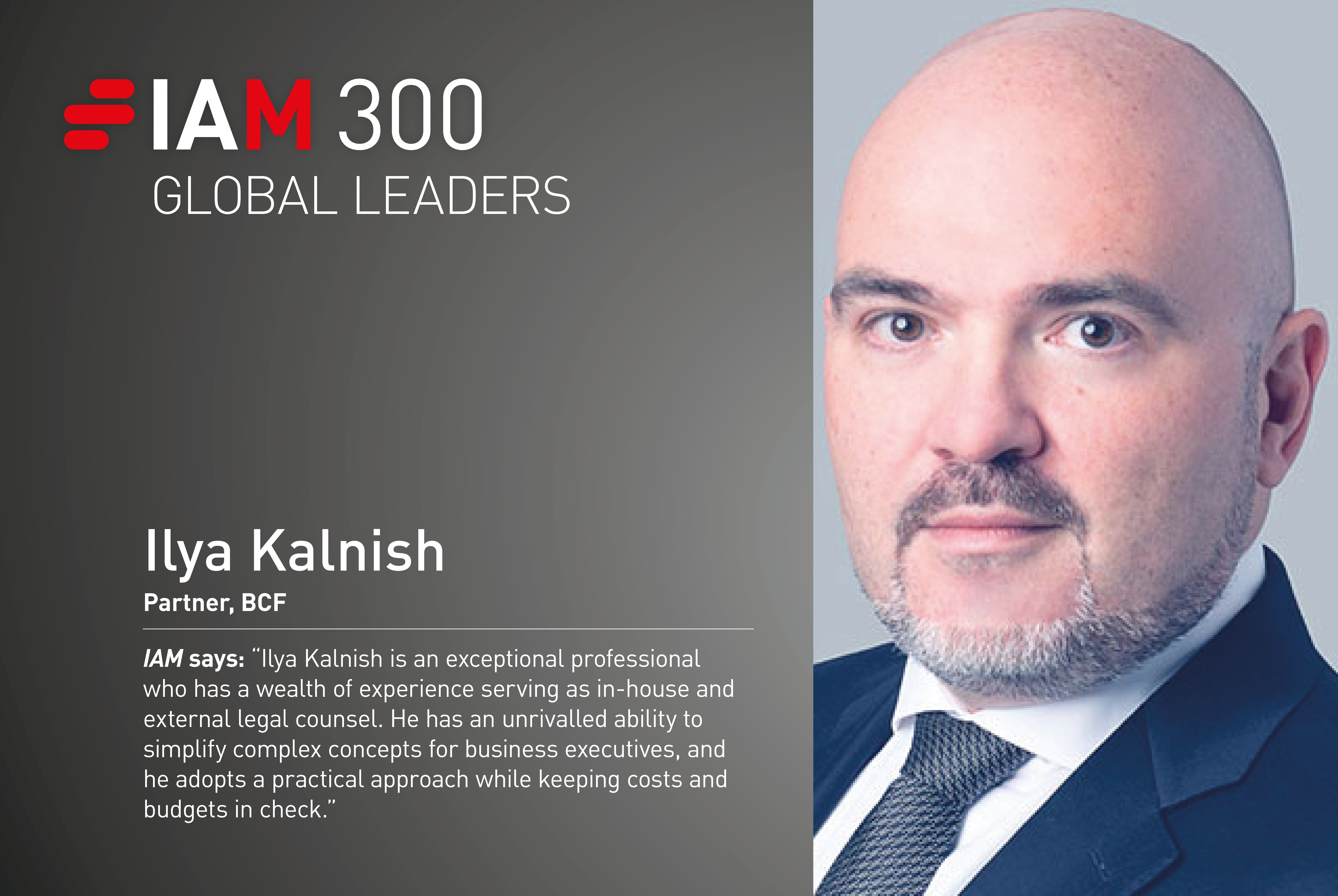Ilya Kalnish
What inspired you to pursue a career in intellectual property, and what advice would you give to others considering a similar path?
My father, involved in a patent-driven tech company, received some bad patent advice, which had devastating consequences. As a teenager, I witnessed first-hand how poor IP guidance can ruin stellar business opportunities.
I was fortunate to land a career in patents, helping businesses make good decisions by providing up-to-date, legally sound, and pragmatic advice. This career sits at the intersection of technology, law and business – one must stay up to date on all three. Be ready to keep your skills sharp and read a lot of materials. This is the only way to make sure we deliver the best possible recommendations to our clients!
During your time at Husky, you won an award for developing successful and holistic IP management strategies. Can you tell us more about this approach?
I was responsible for managing a portion of the global patent portfolio and all IP-related adverse matters. We had a fast-growing portfolio but we realised that certain business developments required us to change the way we handled our intellectual property. We developed a robust and comprehensive method for this – a structured (yet flexible) scorecard approach – both on the procurement and risk-management sides, which is where the term ‘holistic’ came from. This strategy allowed us to do more with less while ensuring that we provided the business with solid tools to make sound IP decisions.
My biggest lesson from this experience was that patents are business tools – proper management is paramount and requires constant adaptation to new business realities.
In your practice, you specialise in AI and IT. Which emerging technologies are having the biggest impact on your clients, and how are you helping them take advantages of new opportunities?
I have been involved with AI and software patents for the past decade – from deep learning for image recognition to self-driving cars and AI-assisted medical treatments. Tech convergence has impressed me most in recent years; AI is penetrating other areas, especially the medical field.
This will keep IP professionals on their toes in terms of keeping skills sharp, cooperating with peers to protect innovation and facing new legal challenges, which could range from data privacy for training data and IT security to protecting data from malicious intrusions.
There is a conversation to be had around whether AI tools (eg, ChatGPT) infringe on intellectual property. What is your take on this?
Given how AI tools produce output (eg, generated text, images, music or other deliverables) and considering how the AI is trained, it is possible that such output infringes IP rights. It is also possible that such output may be at least partially original in itself and even inventive. Laws are reactive by definition – they are developed over time to fit an evolving reality. Just like privacy laws lagged behind the rise of search engines and social networks, the laws today do not neatly fit the new realities that AI tools provide. I am a strong believer that once the full impact of AI tools is recognised, the laws will evolve to cover this.
Despite a lack of clarity, major tech companies and industry newcomers are rushing into the field, creating a great opportunity to develop intellectual property and influence future regulations.
You have worked with a variety of clients of different sizes and stages of their lifecycle. How do you tailor your approach to the type of company that you are dealing with?
During my in-house days, I had to deal with diverse clients: inventors, finance departments, and executives. I quickly learned that the communication style had to vary – technology focused with the inventors and business focused for the executives. I carried this over to private practice. Multinational corporations and start-ups have different needs and communication approaches.
While larger filers typically do not need an education in the patent basics, they do need you to have a deep understanding of their businesses and tailored advice. My key focus is to stay abreast of what is going on in the business and new directions and challenges they are facing to ensure that my advice aligns with their trajectory.
For smaller clients, it is paramount to provide them with a well-rounded picture of what patents can and cannot do for them. I try to take my IP experience and digest it into an easy-to-follow yet comprehensive snapshot of patent systems, processes and best practices.
Ilya Kalnish
Partner
[email protected]
Ilya Kalnish supports both large international corporations and smaller start-ups in developing complex IP strategies. A patent agent in Canada and a US and Canada trademark agent, he specialises in AI, information technology and mechanics. Mr Kalnish is also a member of BCF's board of directors. He is known for his ability to obtain watertight legal protection in multiple jurisdictions for complex inventions while optimising the cost-benefits ratio associated with such procedures.
